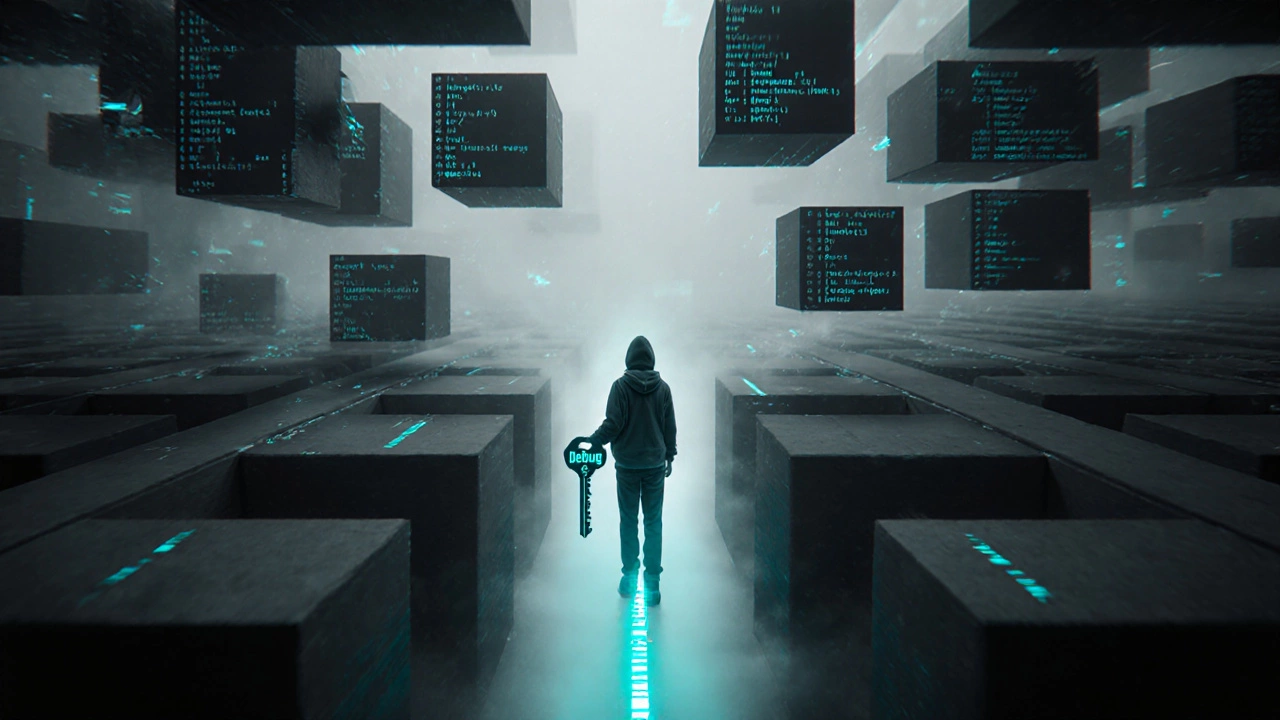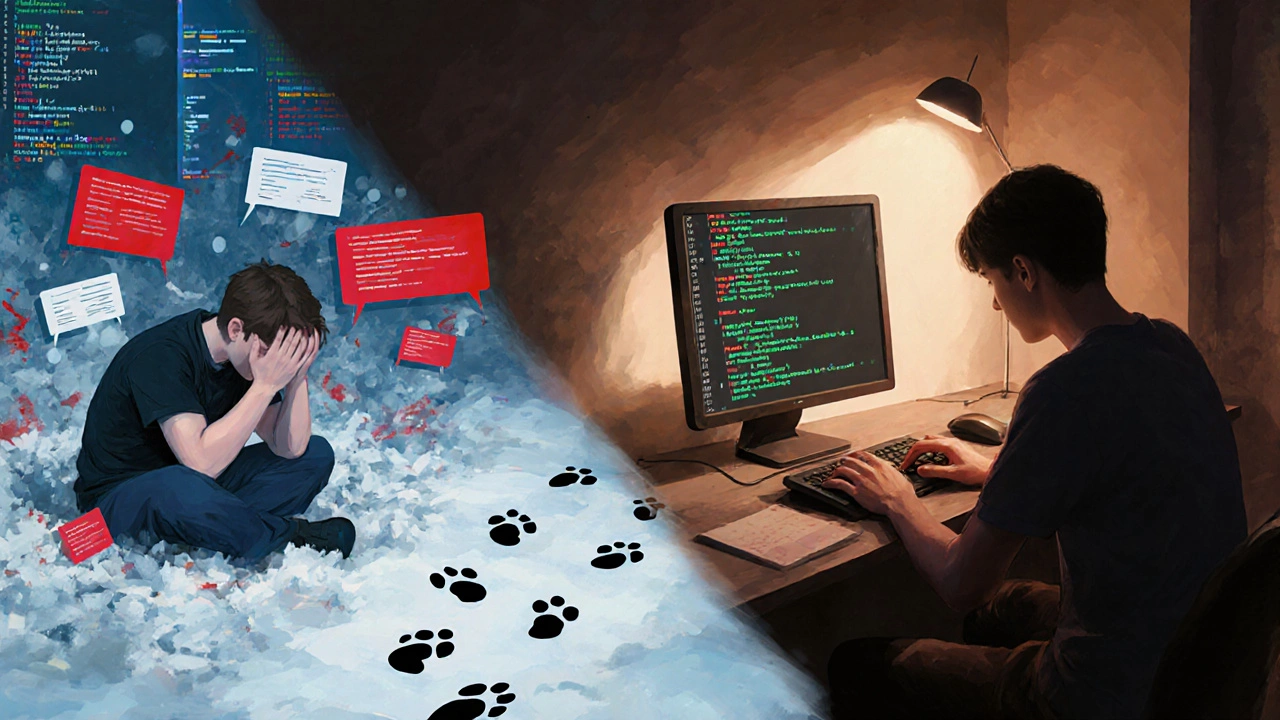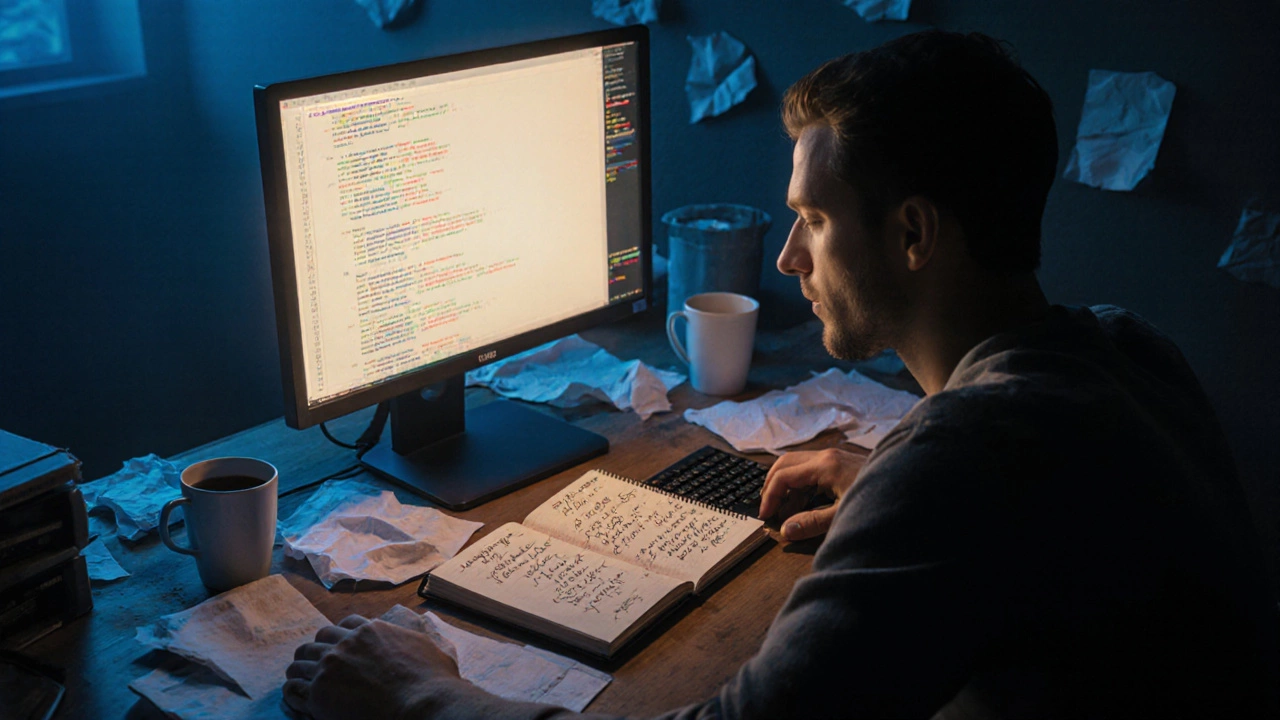Debugging Progress Tracker
Debug Your Progress
Your Debugging Journey
Progress TrackerStart tracking your debugging sessions to see how your confidence grows.
Total time spent debugging: 0 minutes
Everyone starts coding with excitement. You watch videos of people building apps in minutes, read stories about self-taught developers landing six-figure jobs, and think, ‘I can do this too.’ But after a few weeks, something shifts. The syntax feels familiar, the tutorials make sense, yet you’re stuck. Not because you don’t understand the code-but because you can’t make it work. That’s when you realize: the hardest thing about coding isn’t learning syntax. It’s learning how to think.
The Myth of the ‘Code Wizard’
You don’t need to be a math genius or a genius-level programmer to code. What you do need is patience, persistence, and the ability to sit with confusion. Most beginners think coding is about memorizing commands. It’s not. It’s about breaking problems down into tiny, logical steps-and then fixing every little thing that goes wrong.Think of it like cooking. You follow a recipe. You measure the flour. You preheat the oven. But halfway through, the cake sinks. Was it the oven temperature? The baking soda? The flour brand? You don’t know. So you test. You adjust. You try again. Coding is the same. You write a line of code. It doesn’t work. You don’t get an error message that says, ‘You forgot to close the bracket.’ You get a blank screen, a cryptic message like ‘undefined reference,’ or worse-your program runs but gives the wrong answer.
Debugging Is the Real Skill
The number one thing that separates good coders from beginners isn’t how much they know. It’s how they handle mistakes. A beginner sees an error and panics. An experienced coder sees it as a clue.Here’s what actually happens in real coding: you spend 80% of your time debugging. Not writing new code. Not building features. Just fixing what’s broken. One developer I know tracked down a bug that took three days. It was a single missing comma in a JSON file. No syntax highlighter caught it. No linter warned him. He had to compare his file line-by-line with a working version. That’s coding. That’s the grind.
And here’s the kicker: the harder the problem, the less help you’ll get. Stack Overflow won’t have your exact error. YouTube tutorials won’t cover your edge case. You’re on your own. That’s when you learn to read documentation, use console logs, isolate variables, and test small pieces at a time. These aren’t tricks. They’re habits. And they take months to build.
The Emotional Toll
Coding isn’t just mentally hard-it’s emotionally exhausting. You spend hours on something that should take five minutes. You feel stupid. You question if you’re cut out for this. You compare yourself to others who seem to pick it up effortlessly. And you’re not alone. Even senior developers feel this.A 2024 survey of 5,000 developers found that 72% felt imposter syndrome at least once a week. The same survey showed that the most common reason people quit coding wasn’t lack of talent-it was burnout from constant frustration. You’re not failing because you’re bad. You’re failing because you’re learning. And learning to code is like learning a new language while being asked to write a novel in it-on a deadline-with no dictionary.
There’s no magic fix. But there is one rule that helps: progress, not perfection. You don’t need to understand everything. You just need to keep moving. Even if you only fix one small thing today, that’s still progress.

Why Most Coding Classes Fail
Most coding classes teach you how to write code. They don’t teach you how to think like a coder.They show you how to write a for loop. But they don’t show you what to do when the loop runs forever. They teach you how to call a function. But not how to figure out why it’s returning null. They give you projects with clear instructions. But real-world problems? They’re messy. Unclear. Half-baked. And you’re expected to make sense of them.
That’s why so many people finish a coding bootcamp and still can’t build anything on their own. They learned how to follow steps-but not how to solve problems. The best coding courses don’t just give you answers. They give you questions. They force you to struggle. They make you Google. They make you reread documentation. They make you fail-and then try again.
What Actually Works
If you want to get past the hardest part of coding, you need to train your brain differently.- Code every day-even for 20 minutes. Consistency beats intensity. A little daily practice builds muscle memory.
- Write code by hand. No copy-pasting. No autocomplete. Writing it out forces your brain to engage.
- Break problems into smaller pieces. Instead of ‘build a login page,’ start with ‘display a text box.’ Then ‘add a button.’ Then ‘check if the input is empty.’
- Read other people’s code. Not just yours. Look at open-source projects on GitHub. See how others structure things. Even if you don’t understand it all, you’ll start noticing patterns.
- Keep a debugging journal. Write down every error you get. What you tried. What worked. What didn’t. After a few weeks, you’ll start seeing repeats-and that’s when you stop feeling lost.
One student I know kept a notebook of every error she encountered. After two months, she had 87 entries. By month three, she was solving 70% of them without looking anything up. That’s the turning point. That’s when coding stops feeling like magic and starts feeling like logic.

The Mindset Shift
The hardest thing about coding isn’t the language. It’s the mindset. You have to become comfortable with uncertainty. You have to accept that you won’t always know what’s wrong. You have to trust that if you keep poking at the problem, the answer will come.It’s not about being smart. It’s about being stubborn. It’s about sitting with discomfort. It’s about not giving up when your code crashes for the tenth time in a row.
There’s no shortcut. No hack. No ‘code faster’ app that will make you an expert overnight. The only path is through the mess. Through the errors. Through the frustration. And if you stick with it, something strange happens: you start to enjoy it. Not because it’s easy-but because you’ve learned how to solve things on your own.
What Comes Next
If you’re stuck right now, you’re not behind. You’re exactly where you need to be. Every great coder has been here. Every one of them felt like quitting. But they didn’t. They kept going. One small fix at a time.Start tomorrow. Open your editor. Write one line of code. Break it. Fix it. Repeat. That’s the real curriculum. That’s how you learn to code.
Is coding hard if you’re not good at math?
No, you don’t need advanced math to code. Most programming tasks involve basic arithmetic-addition, subtraction, percentages. You don’t need calculus to build a website or a mobile app. Logic matters more than formulas. If you can follow step-by-step instructions, you can code.
Why do I understand tutorials but can’t code on my own?
Tutorials give you the answers. Real coding gives you the problem. When you follow along, your brain doesn’t have to figure out where to start. When you’re on your own, you have to decide what to build first, what tools to use, and how to fix it when it breaks. That’s the gap. Close it by building tiny projects from scratch-no tutorials allowed.
How long does it take to get past the frustration stage?
Most people hit a breakthrough after 3 to 6 months of consistent practice. It’s not about hours-it’s about repetition. If you code for 30 minutes every day, you’ll start recognizing patterns, remembering solutions, and feeling less overwhelmed. Patience is the real skill.
Should I switch languages if I’m stuck?
No. Switching languages won’t fix the problem. The struggle isn’t the language-it’s the thinking. Once you learn how to solve problems in one language, you can transfer that skill to any other. Stick with one until you can build something real without help.
Is it normal to feel like giving up?
Yes. Almost everyone feels this way-beginners and experts alike. Coding is hard because it’s a skill that demands constant problem-solving. Feeling stuck doesn’t mean you’re failing. It means you’re growing. Take a break if you need to, but don’t quit. Come back tomorrow.

